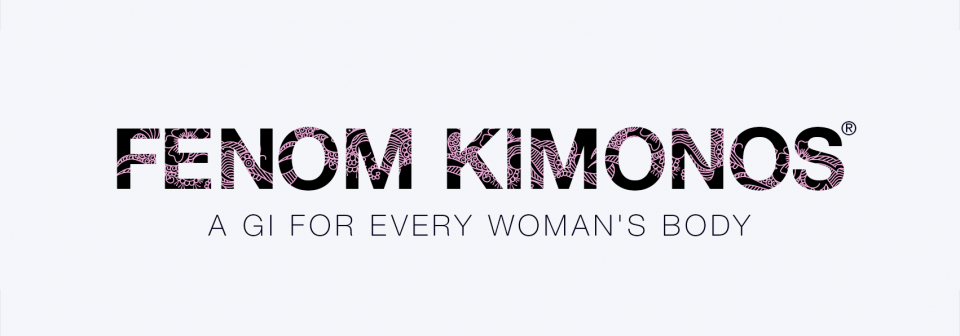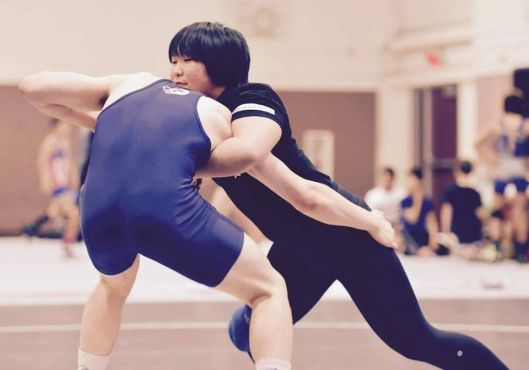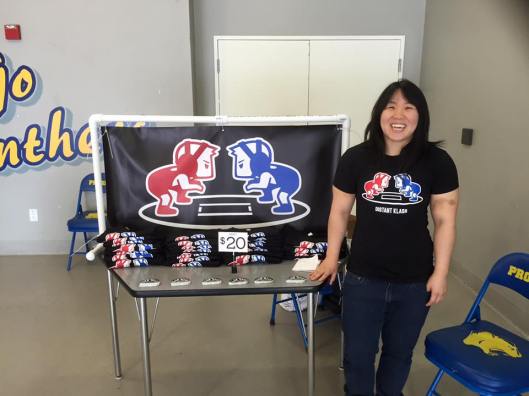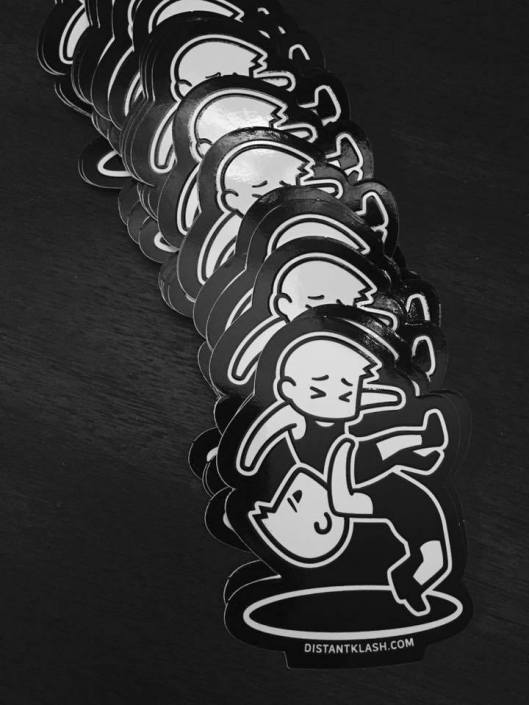Tags
bjj, champion, collaboration, cotton canvas, distant klash, DK, fenom kimonos, jiu-jitsu for women, pearl weave plus, women's gis, women's wrestling
Two women-owned apparel brands, Distant Klash and Fenom Kimonos, partnered up to bring you a limited edition women’s gi design for this holiday shopping season. Distant Klash was founded in 2016 by Kelly Kusumoto, a Bay area native, 2008 California HS Women’s Wrestling State Champion and an artist. We loved her wrestling inspired minimalist style designs so much that we approached her with the idea of designing a gi. Kelly was very happy to collaborate with us and the final product is outstanding.
The collaboration gi jacket is made of 550 gsm pearl weave plus fabric and has beautiful, blue and white embroidery on both sleeves, lapel, back and front. Pants are made of soft, brushed canvas and feature over-sized embroidery on the right thigh. The gi has blue contrast stitching, decorative tape inside the jacket and comes with a custom nylon drawstring cord. This is a limited edition gi: a perfect gift for someone special who loves neutral colors and cute, comic inspired design. We asked Distant Klash owner and creator Kelly Kusumoto to talk a little bit about her art, wrestling, and how her company came about. Read below and happy shopping!
Why wrestling? What attracted you to wrestling? Do you have any other athletes in your immediate family?
Growing up, my mom put me in a variety of sports such as tennis, soccer, basketball, gymnastics and swimming. But at the time I saw sports mainly as an activity and not so much as a passion. While I was in middle school I began training in a Japanese form of karate called Shorinji Kempo and quickly became excited by it. It was fun, but more importantly it felt like I could communicate with someone very directly without actually having to use words.
However, one issue that I had while doing Shorinji was finding sparring partners. Older members found me too forceful and kids my age would avoid me for the same reason. At the end of the year they would hold a ceremony where they gave awards and recognition to people who had improved and had done well throughout the year. As a little joke they gave a an award for “Most Aggressive Sparring”. I was super excited to be positively acknowledged for being strong. It was a very proud moment for me.
When I reached high school a friend who was on the wrestling team encouraged me to join. At first I wasn’t very receptive of the idea, but eventually I decided to do it. I saw it mostly as a way to expand upon the martial arts I knew at that time, like learning new words in a language.
My first practice was during the summer after freshman year and I found myself in a very new environment. There were a lot of things I had to adjust to. I was thrown into a world where I was pushing my conditioning and strength training to an extreme. I had to learn how to handle being in an environment where all my training partners were boys. Perhaps the most difficult part was just being around people who did not know me and did not want to wrestle a girl. I found myself feeling a bit isolated and lost. Despite those challenges I stayed focused on the training and I felt that this was the environment I could learn to thrive in. It gave me a chance to fully express my aggressive energy without any restrictions.
In terms of having athletes in the family, my dad’s side of the family practiced judo but I was never taught any. Instead, my dad loved to roughhouse with me as his way of interacting and playing with me. I feel that as a result of those play sessions I began to associate the idea of fun with activities that were very physical.
You became a state champion in California. How did you achieve it? What is life like for a wrestler?
As a student athlete my practices would go until early evening. I did not get home until 6 or 6:30. By the time I got home and washed up, there were only a few hours left to eat, do homework and prepare for the next day. Even simple things like staying awake during class was difficult because I was so exhausted from practice.
The greatest impact wrestling left on me was how to control my diet. Growing up I knew that junk food was bad, but I did not really care about my health. With wrestling I began to refrain from eating junk food. I quickly learned that it was not practical to eat before practice unless I was okay feeling sick and sluggish during practice. I just started to be more careful about what I ate and how frequently. Often times I struggled to eat enough calories because it felt like I was burning more than what I could actually consume.
On a weekly basis practice was after school for three hours, five days a week. Once the season got going there would be a tournament every Saturday. In my first few years of wrestling I was so bad that I would try to do extra drills at night. I was quite desperate to improve so I also practiced visualizing to try to perfect the moves I had learned.
I think what added to my desperation was being the only girl on the team. I wrestled with boys exclusively so I did not have a sense of how my skill level measured against girls. In my first year I went to a few tournaments at the JV level with boys and barely won any matches. I decided that during off season I would hit the gym to become physically stronger.
By junior and senior year I was beginning to feel more even with the boys and I was slowly gaining some confidence. During my senior year I decided to go to more girl tournament and after having wrestled with boys for so long I found myself doing very well in the girls’ division. I placed 1st in almost all of them.
At the girls’ state tournament I was very nervous and did not perform as well as I usually did. I could not pin anyone and was feeling really anxious. By the time I made it to the finals I was really getting nervous. I got caught in a head and arm throw and was very close to getting pinned. The realization that I might lose snapped me back into a better head space and I ended up winning the finals.
Do you still go to your old high school to coach kids?
I used to coach only at my high school but I have expanded my reach to go to any high school with female wrestlers. If they ask me to come and help, I will do anything I can to make time for them. I feel like I can relate to the struggles that these girls are going through because of my experience as a girl wrestler. I understand their frustrations and do my best to lead by example. I know that it is also very comforting for them because sometimes it is difficult to discuss gender specific issues with a male coach.
In college you decided to quit wrestling and focus on graphic design. What prompted that decision?
During my childhood I drew a lot and wanted to purse art in college. However, I was also excited about wrestling and wanted to see how far I could take it. I finally landed on the decision to go wrestle on a woman’s team at the University of the Cumberlands in Kentucky and pursue an Arts degree there.
However, within a few months I was starting to feel very unsatisfied with both the wrestling and the art program. The wrestling program had a lot of problems but simply put, I did not like the coaching. I did not feel challenged and was starting to get very homesick. To make matters worse, the art program was also very weak. It felt like a high school program and I could see that this was not the right path for me.
I wanted to get out of Kentucky as soon as possible so I left after my first semester. I came back completely broken. I felt like I had disappointed a lot of people and did not know where to go next. I ended up going to a community college where my coach was teaching at. I was able to wrestle under him for one more season. Once again I was wrestling among all boys. Wrestling in college was even more difficult than high school but it was a great experience that washed away all the bad memories from the Cumberlands. I decided to let wrestling go and just focus on art. I got my associates degree and transferred to an art college in San Francisco.
Talk a little bit about your brand. How did you develop such a cool minimalist style? Where did the name come from?
During my time in school I learned how to design logos. Logo design is really different from traditional illustration in that everything is purely symbolic. The goal is to create a design that conveys a lot of information using as few lines and shapes as possible. I got the hang of this pretty quickly and really loved the impact and strength of a clean minimalist design.
I made the first DK design of the two boys in a wrestling stance several years after I graduated college. It actually took me a while to figure out how to draw it because it is very difficult to simplify human movements. As I was drawing it, I began to realize why there were so few wrestling designs that were available. It is really hard because it requires making a lot of design choices for the size and placement of each body part.
However once I was done I was very excited and so relieved. I felt like I was able to accurately depict who I was. All this time I had been going back and forth between my identity as an artist who likes cute things, and as a wrestler who loved to be tough. It almost felt like I was living a double life but now the two worlds could merge together
At this point in my life I had graduated college and I was no longer a part of any wrestling team. I still had a lot of nostalgia lingering from my wrestling days. I think many alumni wrestlers like myself struggle with a lack of identity when they no longer have the time or place to wrestle. The wrestler inside of us never really goes away, so the name Distant Klash was born as a reflection of what wrestling means to me now: a fight from the past, a “distant clash”.
I want it also to represent the younger generation who work hard and train for their next fight. I always feel honored when I am allowed to be a part of their journey to becoming the best wrestler they can be. For them, their wrestling career is still alive and strong and their future is a soon to be “distant clash”.
What are you plans for DK future?
Although DK currently focuses on martial arts, I would love to expand out to other sports. Wrestling is my favorite sport but I have a deep appreciation for all types of movement whether it be in dance, sports or any other physical endeavor. Movement is one of many ways people express themselves and I want to create art that allows people to see that.
Even personally speaking, the wrestling designs I made have allowed me to share my passion for wrestling in a way that overrides any preconceived ideas they may hold. When I tell them that I wrestle, I can tell them what it is really like and how it has positively impacted me. It may seem like a small change but I definitely feel much more confident when I can openly express who I am. I want to be able to extend this feeling to other athletes who may also be in the same predicament.
























